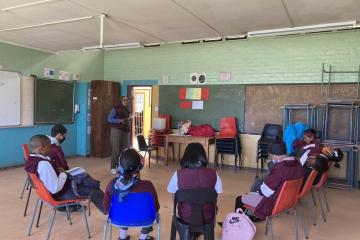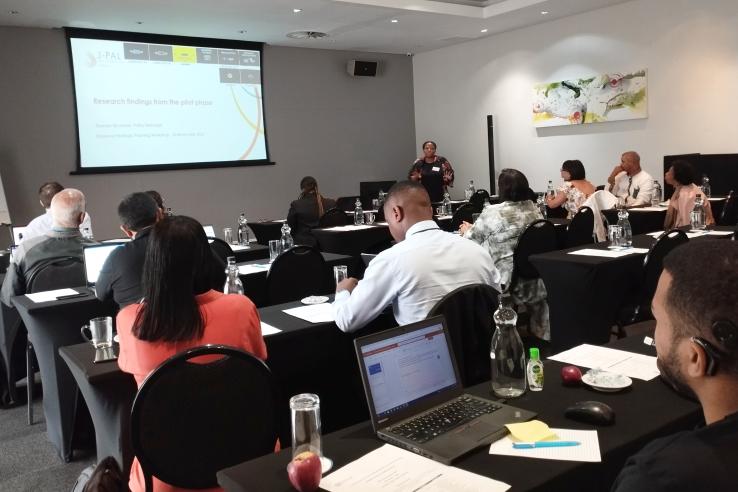
Shukuma in South African schools: Fostering strong partnerships to address violence in the Western Cape

Policymakers in South Africa, and in the Western Cape in particular, are faced with the difficult task of addressing high rates of crime and violence in their communities. The South African Police Services reported that between 2020 and 2022 total contact crimes (crimes against a person including murder and attempted murder, sexual offenses, common assault and robbery) increased by 13.4 percent. Additionally, as of 2019, 29 percent of all contact crime perpetrated by youth ages ten to seventeen in the country occurred in the Western Cape.
In 2019, representatives from the Western Cape Government’s (WCG) Department of the Premier's Office (DotP) attended J-PAL Africa’s Evaluating Social Programs (ESP) course in Cape Town to learn more about how evidence from randomized evaluations can inform program design and implementation. During ESP participants learned about research on cognitive behavioral therapy (CBT)-based interventions and its impact on preventing criminal and antisocial behaviors amongst youth. This sparked the DotP’s interest in behavioral interventions as a mechanism to prevent and or combat violence.
CBT-based interventions offer a potential solution to reduce violence among youth. Previous research suggests that CBT-inspired programs can help reduce self-destructive behaviors by teaching individuals to evaluate and modify the way they think and the decisions they make. Rather than simply teaching good behaviors or nudging participants towards certain choices, CBT teaches concrete methods to better relate to one’s environment and practices strategies to regulate harmful, automatic behavior.
Following their participation in ESP, the DotP partnered with J-PAL Africa and embarked on a journey to build the Shukuma: Moving Mindsets program—a behavioral program for violence reduction in schools in the Western Cape. Throughout this process, J-PAL Africa provided design support and technical assistance to the WCG, as both a thought and research partner. Being involved in the Shukuma program highlighted the importance of strong partnerships in successfully implementing new evidence informed programs.
Designing the Shukuma program and adapting CBT to the South African context
J-PAL supported the DotP to design a CBT-inspired program based on evaluations of similar interventions from around the world. To do so, the J-PAL team leveraged the generalisability puzzle—a practical tool used to decide whether a particular approach makes sense in a new context. The key to the generalisability framework is it breaks down the question “will this program work here?” into a series of smaller questions based on the theory behind a program.
During the project inception phase of Shukuma, J-PAL and the DotP, created a theory of change to depict the causal links between the intervention and its intended impact by considering the local context, global evidence and lessons learned from previous evaluations, and local implementation conditions.
To consider the local context, the WCG commissioned a needs assessment in ten high schools to accurately identify the behavioral challenges in schools, which informed where and how this project could be integrated into the school system. The needs assessment also helped the team better understand the behaviors driving violence in and around schools in the Western Cape to understand if a CBT-based approach was an appropriate fit. The findings from the needs assessment showed that the majority of learners experienced violence in their schools and/or their community and the proximity to gang violence was high among the group surveyed.
The team also looked at global evidence from randomized evaluations when designing the program. Numerous studies have indicated a significant impact of CBT-inspired programs on reducing criminal behavior and enhancing academic outcomes. For example, research on a CBT-inspired program in Chicago found that youth in juvenile detention centers who received CBT were 39 percent less likely to be readmitted within two months of release, a reduction that persisted eighteen months later.
In Liberia, researchers also found that an intervention combining a CBT-style program and cash transfers had substantial and enduring effects. Crime rates among participants who had received therapy in addition to a cash transfer fell by up to nearly half, with these effects persisting after one year.
In another study, the application of the CBT-inspired "Becoming a Man (BAM)" curriculum in low-income public schools in Chicago resulted in a 12 percent reduction in student arrests, accompanied by a 9 percent increase in on-time high school graduation rates. This research on the BAM program in particular, given its grounding in school-based CBT principles, laid the groundwork for Shukuma in South Africa's Western Cape.
Curriculum experts, with expertise on CBT-type programming and in local education and curriculum development, then created the curriculum so that the program could be relatable to learners and delivered at the appropriate level. Partnering with the DotP and the Western Cape Education Department (WCED) provided additional insight into the local schooling system and enabled the team to identify who to appropriately target, how to do so, and when to deliver the program.
Reflections from the DotP team in operationalising Shukuma
Collaborative efforts among multiple stakeholders to design and implement the pilot program were essential to its success. Representatives from the WCED’s Positive Behavioral Programme and Safe Schools Programmes provided critical contextual expertise to ensure the program was suitable for the youth and appropriate within the broader government system. J-PAL affiliated professor Julian Jamison joined the project team to provide expertise on the design of the CBT-inspired program. Throughout the project, J-PAL also embedded staff in the DotP office to gain further understanding of program implementation and to provide coordination support.
Fostering strong relationships by drawing on one another’s strengths
After numerous theory of change and design workshops with the WCG, it became clear that the program model needed to be tested before piloting in a larger cohort of schools. The WCG and J-PAL Africa rolled out a pre-pilot study in four schools, and involved sixteen volunteer session facilitators.
As the pre-pilot shifted to the implementation phase, J-PAL colleagues assisted in operationalising both the programmatic and research elements of the intervention—for example, assisting facilitator training and managing facilitator school groups and administering consent forms and learner focus groups. The government partners focused on supporting day-to-day operations and building buy-in for the program amongst the government and participating schools.
J-PAL also supported the DotP to make the case for Shukuma internally in WCG, co-presenting to several different fora and committees. Of particular importance were the strategic planning events, where J-PAL presented the evidence base and research findings from the pre-pilot and pilot studies. By translating academic research into accessible and relevant findings, J-PAL assisted the DotP in building support for the program, and providing evidence for decision-makers.
Working closely together on both the research and programmatic elements of the intervention was critical to the successful delivery of a complex program in tight timelines.
Adapting a learning mindset
From the outset, the project team prioritized consultation and collaborative learning, by involving the program implementers in monitoring and evaluation and research discussions. J-PAL adopted a continuous learning approach to answer open research questions and those that emerged throughout the project. This allowed the team to learn from and to adapt the program as it unfolded, based on the feedback from learners, facilitators, and schools.
There were several key lessons from the pre-pilot. First, it was essential to onboard school staff and WCED district and circuit managers (who were officials dedicated to supporting specific schools) to the program for it to run successfully in schools. Second, the buy-in from government officials, including the WCED, was critical for implementing the programming in schools with fidelity. Third, the pre-pilot showed that facilitators who were relatable and from the local community worked well within school settings. Lastly, bringing in more partners to make sure that there was strong alignment and support for the program was key to successfully running the program in schools.
Taking Shukuma forward
Establishing strong partnerships between J-PAL, the implementing team, and government departments led to the successful incubation of the Shukuma program in 2022. The mutual trust built between team members has allowed for a smooth handover of the program to the WCG’s service delivery departments in 2023.
In 2023, the Shukuma program entered its consolidation phase, intended to stabilize the program design and delivery for future evaluations. The program was delivered to approximately 12,000 grade 8 learners in 33 high schools, by 175 facilitators managed through the YearBeyond programme, with a local NGO as an implementing partner. The program is anticipated to continue to be delivered and be evaluated for impact in 2024.


